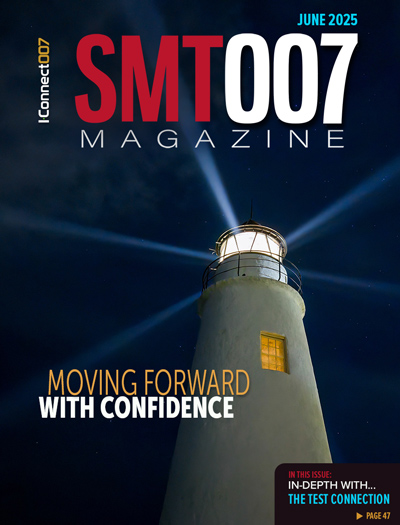-

- News
- Books
Featured Books
- smt007 Magazine
Latest Issues
Current Issue
Supply Chain Strategies
A successful brand is built on strong customer relationships—anchored by a well-orchestrated supply chain at its core. This month, we look at how managing your supply chain directly influences customer perception.

What's Your Sweet Spot?
Are you in a niche that’s growing or shrinking? Is it time to reassess and refocus? We spotlight companies thriving by redefining or reinforcing their niche. What are their insights?

Moving Forward With Confidence
In this issue, we focus on sales and quoting, workforce training, new IPC leadership in the U.S. and Canada, the effects of tariffs, CFX standards, and much more—all designed to provide perspective as you move through the cloud bank of today's shifting economic market.
- Articles
- Columns
- Links
- Media kit
||| MENU - smt007 Magazine
Incap Backs Solaride, First Solar-Powered Car in the Baltics
November 30, 2021 | IncapEstimated reading time: 1 minute
Incap Estonia, based on the island of Saaremaa, has supported a student project Solaride in which the first solar-powered car in Baltics was built. Some of the car’s electronic parts were assembled in the Incap’s Kuressaare factory, located in Saaremaa.
According to Greg Grace, the Managing Director of Incap Estonia, it has been a great opportunity for Incap to sponsor such an innovative and unique solar-powered car project. “We are working together with a great team of young developers who assembled the very first solar-powered car in the Baltics. Our company here in Saaremaa manufactured electronics designed by Solaride’s developers specifically for this car. A total of seven different electronic boards for the solar-powered car were produced, including the ECU (Electronic Control Unit), the battery management system and the sensor boards,” said Grace.
The overall goal of the Solaride project was to implement knowledge of solar processes acquired in the university. Some Estonian companies such as Incap Estonia also played an important role in assembling the car powered by renewable energy, as such some manufacturing processes took place locally.
Incap Estonia, based in Kuressaare, Saaremaa, was one of such companies. Incap collaborates with various schools in Saaremaa, as well as on the mainland of Estonia, by supporting young developers in strengthening their knowledge through apprenticeships. In recognition of this cooperation and ongoing support, the company received this year’s award for the best regional internship provider.
“We are grateful to have the support of so many student-friendly Estonian companies. Initially we ordered the circuit boards necessary for the battery and soldered them ourselves, but thanks to Incap these parts now have much higher quality and reliability,” said the engineering project manager of Solaride, Mart Erik Kermes, praising the cooperation between the project and its supporters. He summarizes that Solaride is a bunch of progressive pioneers of the future who are building Estonia’s first solar car to face the ultimate challenge to prove how successfully students can create innovation.
As an educational technology project involving young talents and top mentors from various Estonian universities and companies, the goal of Solaride is to popularise engineering education and sustainable technology, and to empower young talents with valuable practical experience, skills and networks.
Testimonial
"Advertising in PCB007 Magazine has been a great way to showcase our bare board testers to the right audience. The I-Connect007 team makes the process smooth and professional. We’re proud to be featured in such a trusted publication."
Klaus Koziol - atgSuggested Items
PEDC Call for Abstracts Deadline Extended to Aug. 31
08/20/2025 | I-Connect007 Editorial TeamThe second Pan-European Electronics Design Conference (PEDC) will take place Jan. 21-22, 2026, in Prague, Czech Republic. The call for abstracts deadline has been extended to Aug. 31. Organized jointly by the German Electronics Design and Manufacturing Association (FED) and the Global Electronics Association (formerly IPC), PEDC serves as a European platform for knowledge exchange, networking, and innovation in electronics design and development.
The Power Shift in U.S. Manufacturing Ownership
08/20/2025 | Nolan Johnson, I-Connect007The U.S. manufacturing landscape is driven by reshoring initiatives, supply chain realignments, and a surge of foreign interest. What does that mean for U.S.-based PCB and EMS companies? In this interview, mergers and acquisitions expert Tom Kastner breaks down the forces reshaping the industry—why foreign investors are eager to enter the U.S. market, why many are evaluating greenfield facilities over acquisitions, and why the high-mix, low-volume focus of most domestic shops doesn’t always align with foreign buyers’ goals.
Facing the Future: Challenges and Opportunities in Reshoring PCB Manufacturing
08/12/2025 | Prashant Patel -- Column: Facing the FutureFor decades, offshore manufacturing dominated the global electronics industry. The pursuit of cost efficiency, scalability, and access to vast labor markets made countries like China, Taiwan, and Vietnam attractive destinations for printed circuit board (PCB) production. But a seismic shift is underway, from geopolitical instability and supply chain disruptions to rising labor costs and national security concerns.
Hon Hai Technology Group (Foxconn) and TECO Announce Strategic Alliance Targeting AI Data Center Capabilities
07/31/2025 | Hon Hai Technology GroupHon Hai Technology Group (“Foxconn”) and TECO Electric & Machinery Co Ltd (“TECO”) on Wednesday announced a share exchange, strategic alliance that will strengthen their AI infrastructure capabilities and propel the two Taiwanese tech majors into key markets in the global super-computing race.
Direct Metallization: A Sustainable Shift in PCB Fabrication
07/31/2025 | Jim Watkowski, Harry Yang, and Mark Edwards, MacDermid Alpha Electronics SolutionsThe global electronics industry is undergoing a significant transformation, driven by the need for more resilient supply chains and environmentally sustainable manufacturing practices. Printed circuit boards (PCBs), the backbone of interconnection for electronic devices, are at the center of this shift. Traditionally, PCB fabrication has relied heavily on electroless copper, a process that, while effective, is resource-intensive and environmentally hazardous. In response, many manufacturers are turning to direct metallization technologies as a cleaner, more efficient alternative.


